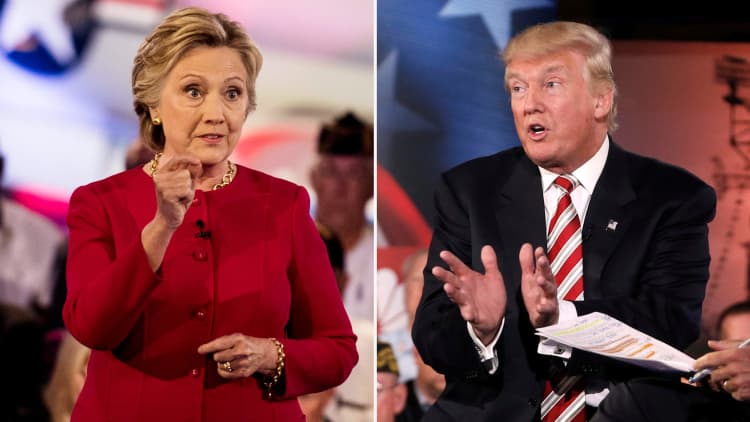
After endless debate over the honesty of America's presidential candidates, voters on Monday night get 90 minutes of pure transparency.
The first 2016 general election debate will place both Hillary Clinton and Donald Trump under a microscope more searching than either has experienced before. The audience may reach 100 million people, encompassing the vast majority of November's electorate.
Their challenge, under enormous pressure, is to present the best versions of themselves.
For Clinton, that means displaying her characteristic command of policy detail while not appearing arrogant or condescending to Trump or his supporters. At a time when many Americans question her honesty and believe she's out for herself, the former secretary of state needs to paint a sympathetic portrait of her motivations for wavering voters.
For Trump, it means building on the reality television star quality that built him a fervent following during Republican primaries. With polls showing a majority of voters doubt him on temperament and experience grounds, he needs to display a presidential demeanor and greater command of issues than he has so far.
Trump faces the greater burden. Though polls have tightened, he trails nationally and in crucial battleground states.
Having built a base of support among white voters without college educations, the billionaire real estate developer needs to expand his backing among college-educated whites — especially women. So far, they have not warmed to his bombastic, pugnacious style.
Historical evidence on the impact of debates remains mixed. Some credit the 1960 debates with helping John F. Kennedy defeat Richard M. Nixon, whose perspiring visage paled alongside his cool, urbane opponent. By reassuring discontented voters he was a safe, appealing alternative to President Jimmy Carter, Ronald Reagan accelerated his momentum in their sole 1980 debate on the way to a landslide victory.
More recently, general election candidates have debated multiple times, with the first encounter having the most impact in favor of challengers to incumbent presidents. But their gains — for John Kerry against George W. Bush in 2004 and for Mitt Romney against President Barack Obama in 2012 — proved ephemeral.
The closest parallel to this year's faceoff may lie in the 2000 debates pitting Vice President Al Gore against Texas Gov. George Bush. Gore, like Clinton now, entered the contests with superior knowledge of federal policy and issues.
But Bush, aided by a skillful post-debate communications strategy to shape media coverage, emerged from their three encounters on the right side of a contrast between likability and arrogance. A similar result this year would provide a major boost for Trump.


